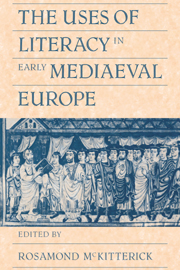Book contents
- Frontmatter
- Contents
- List of illustrations
- Contributors
- Preface
- Abbreviations
- Introduction
- 1 Literacy in Ireland: the evidence of the Patrick dossier in the Book of Armagh
- 2 Anglo-Saxon lay society and the written word
- 3 Administration, law and culture in Merovingian Gaul
- 4 Literacy and the papal government in late antiquity and the early middle ages
- 5 Literacy and the laity in early mediaeval Spain
- 6 Aspects of mediaeval Jewish literacy
- 7 Writing in early mediaeval Byzantium
- 8 Literacy displayed: the use of inscriptions at the monastery of San Vincenzo al Volturno in the early ninth century
- 9 Royal government and the written word in late Anglo-Saxon England
- 10 Literacy in Carolingian government
- 11 Text and image in the Carolingian world
- Conclusion
- Index
9 - Royal government and the written word in late Anglo-Saxon England
Published online by Cambridge University Press: 07 December 2009
- Frontmatter
- Contents
- List of illustrations
- Contributors
- Preface
- Abbreviations
- Introduction
- 1 Literacy in Ireland: the evidence of the Patrick dossier in the Book of Armagh
- 2 Anglo-Saxon lay society and the written word
- 3 Administration, law and culture in Merovingian Gaul
- 4 Literacy and the papal government in late antiquity and the early middle ages
- 5 Literacy and the laity in early mediaeval Spain
- 6 Aspects of mediaeval Jewish literacy
- 7 Writing in early mediaeval Byzantium
- 8 Literacy displayed: the use of inscriptions at the monastery of San Vincenzo al Volturno in the early ninth century
- 9 Royal government and the written word in late Anglo-Saxon England
- 10 Literacy in Carolingian government
- 11 Text and image in the Carolingian world
- Conclusion
- Index
Summary
Whatever is transacted by men of this world to endure for ever ought to be fortified securely with ranks of letters, because the frail memory of men in dying forgets what the writing of letters preserves and retains.
Such statements extolling the advantages of the written record are quite commonly found in the proems of Anglo-Saxon charters, from the seventh century to the eleventh; nor should the fact occasion any surprise, for it is only to be expected that those responsible for drafting and writing the charters themselves would wish to advertize the benefits of their own labours. It is a different matter, however, whether this appreciation of the value of the written word extended into any of the other routine procedures of Anglo-Saxon royal government: one might ask, for example, whether written documents had a part to play in the formulation and publication of royal law, and more generally in the operation of legal processes; or whether kings came to depend to some extent on written documents for conveying messages and instructions to others, including their officials in the localities; or whether information was transmitted from one official to another, or from any official back to the king, by the same means; or whether use was made of the written word in such matters as the assessment and collection of taxes, the performance of military services and the administration of royal estates. In addressing some of these questions it might be useful to glance initially across the Channel, before proceeding to survey the evidence which bears more directly on the use made of the written word in late Anglo-Saxon royal government.
- Type
- Chapter
- Information
- The Uses of Literacy in Early Mediaeval Europe , pp. 226 - 257Publisher: Cambridge University PressPrint publication year: 1990
- 17
- Cited by



